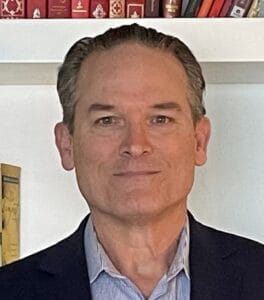Breaking the Wealth Barrier: A New Vision for Retail Participation in Private Equity
Over the course of this podcast, I’ve had the privilege of speaking with some of the most forward-thinking minds in capital formation, Fintech, and policy. But every so often, a guest brings together big ideas, real-world urgency, and actionable solutions in a way that lingers with you well beyond the episode.
That’s how I felt after my conversation with Andrew Benson, founder of Hill.com.
Andrew’s mission is bold but deceptively simple: open up access to private markets—not just for the wealthy, but for everyone.
And as we unpacked in Episode 30 of Capital Ideas, it’s a mission rooted in deep experience, regulatory fluency, and a clear-eyed recognition that the current system wasn’t built for inclusion.
The Core Problem: Access Denied
For too long, the ability to invest in high-growth startups and private companies has been gated behind arbitrary rules—chief among them, the accredited investor standard. This framework assumes that wealth equals sophistication, and it locks millions of capable, curious, informed individuals out of some of the most powerful engines of wealth generation in our economy.
Meanwhile, the IPO window continues to shrink. Companies stay private longer, often delivering their biggest returns to insiders and early backers while retail investors get the leftovers—if they’re lucky enough to get anything at all.
A recent chart published by the Investor Choice Advocates Network (ICAN) illustrates the stakes. As shown below, the late-stage venture capital sweet spot – Series C through pre-IPO – offers some of the best risk-adjusted returns in the private markets. Notably, these are the very companies that, in a previous era, would have already been public and available to retail investors.
Yet, today, these “sweet-spot” stage companies remain largely inaccessible to unaccredited investors.Andrew didn’t need to convince me of the problem. I’ve seen it up close. But what impressed me is how he and his team at Hill.com are navigating around it.
Andrew didn’t need to convince me of the problem. I’ve seen it up close. But what impressed me is how he and his team at Hill.com are navigating around it.
A Platform Designed for Access—Not Exclusivity
Hill.com is building a marketplace where individuals can invest in late-stage private companies before they go public—or even if they never do. What makes this different from past efforts is the structure. Using SPVs (Special Purpose Vehicles) and fractional investments, Hill.com enables smaller investors to pool their capital and gain access to deals that would otherwise be out of reach.
But this isn’t a spray-and-pray investing platform. It’s carefully curated. The team is taking compliance seriously. They’re deeply engaged in the mechanics of regulation, not to skirt the rules, but to use them in creative and compliant ways to bring more people into the fold.
We talked about how the accredited investor definition is outdated, and how Hill.com is working to offer both Regulation D and Reg A+ pathways to broaden participation. It’s that dual awareness—of the current limitations and the possible solutions—that makes Andrew’s approach so compelling.
More Than a Marketplace
One thing that stood out in our discussion is how much Hill.com thinks about education and transparency. This isn’t a casino. It’s not about creating the next meme stock moment. It’s about informed investing in vetted opportunities. Hill.com is investing in user education, plain-language disclosures, and tools that help everyday investors understand what they’re buying into.
This isn’t just about compliance. It’s about trust.
And in a market landscape increasingly dominated by complexity and opacity, that commitment to clarity matters.
The Big Picture
The implications go far beyond individual deals. If platforms like Hill.com succeed, they could fundamentally reshape the capital stack—not just who invests, but how companies raise money, build community, and scale.
Imagine a future where a company’s customers are also its investors. Where supporters don’t just back a mission, but share in its growth. Where capital formation isn’t bottlenecked by geography, pedigree, or a minimum balance sheet.
That’s not utopian. It’s entirely achievable if we keep pushing on the levers that Andrew Benson is highlighting—regulatory innovation, fractionalization, and mission-driven product design.
Why This Conversation Matters
As a former SEC attorney, I’m always tuned into the friction between regulation and innovation. What struck me in this episode is how Andrew navigates that tension not with cynicism, but with strategic optimism.
He’s not waiting for the rules to change. He’s building with the rules we have—and leaving the door open for others to follow.
If we want capital markets that reflect the diversity, energy, and ingenuity of our country, we need more builders like Andrew Benson. And we need more platforms like Hill.com.
This was one of those conversations that made me hopeful—not just about fintech, but about what’s possible when smart regulation meets bold entrepreneurship.
Nick Morgan is President and Founder of ICAN, the Investor Choice Advocates Network, a nonprofit public interest litigation organization dedicated to serving as a legal advocate and voice for everyday investors and entrepreneurs. He was previously a partner in the Investigations and White Collar Defense Group at Paul Hastings law firm. Morgan previously served as Senior Trial Counsel in the SEC’s Division of Enforcement. Capital Ideas is a series created by Morgan and Dara Albright.




